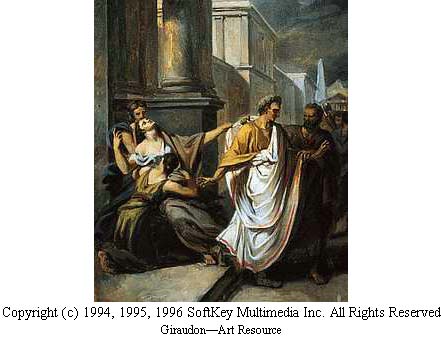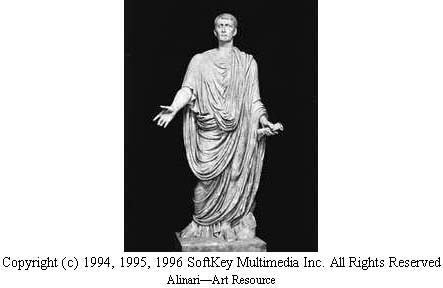
Amazon.com International Sites :
USA, United Kingdom, Germany, France
Books about Julius Caesar :
(102?-44 BC). Assassins ended the career of Julius Caesar before he had finished his lifework. But what he accomplished
made him one of the few men who changed the course of civilization. Some historians consider him Rome's greatest
genius. He was a soldier of remarkable ability, an accomplished scholar and writer, and a statesman gifted with
enormous insight. He changed the chaos of an outworn system of government into the foundations of a new order that
produced the greatest of all ancient empires. (See also Augustus.)
When Caesar was a young man, he was captured by pirates in the eastern Mediterranean. When they demanded 20 talents
(units of weight) of gold for ransom or they would kill him, he said: "What! Only 20 talents? I will give
you 50 talents for my life!"
While messengers were sent to Miletus for the money, Caesar joked with his captors and vowed to hang them all someday.
The pirates were greatly amused at his high spirits. They had no idea that he would come back to carry out his
threat. But within a few weeks after his release the whole pirate band was captured and put to death.
Hiding his serious character under a mask of light-hearted gaiety, Caesar made himself a favorite with the people
of Rome. When he was overseer of public games (66 BC), he increased his popularity by preparing magnificent spectacles
in the Circus Maximus for the pleasure-loving Romans at the cost of a crushing burden of debt for himself. The
dignified Roman senators would have scorned any suggestion that this careless young fop would someday be the conqueror
of the world. No one realized that his smiling manner covered a shrewd penetration and purpose. He saw the rottenness
of the existing government and the need of a strong central power to save Rome from decay. He felt that he was
the one person to bring this change about. This was his determined aim, and as a part of his plan he formed a political
alliance with the two most powerful men in Rome, the wealthy Crassus and the popular general Pompey (see Pompey
the Great). As a result Caesar was elected consul in 59 BC. After his year of office, he decided to leave Rome
to govern Gaul, the country that is now France.
Gaul gave Caesar the opportunity to show his great qualities as a leader, an organizer, and a general. He so endeared
himself to his soldiers that they would follow him anywhere. He worked with them, fought with them, and suffered
the same hardships.
He conquered tribe after tribe of barbarians. In 55 BC Caesar crossed the Rhine in an attempt to stop the Germanic
invasions. Twice he landed in Britain. In 52 BC he put down the last great Gallic uprising.
Meanwhile Crassus had been killed. Pompey, who had sided with Caesar's enemies, was sole consul, with enormous
powers. The Senate declared Caesar a public enemy and ordered him to disband his army.
The river Rubicon marked the boundary between Caesar's province and Italy. Crossing it with an army meant declaring
war on Rome. When Caesar reached the river (Jan. 10, 49 BC), he plunged his horse into its shallow water and exclaimed,
Alea jacta est ("The die is cast"). The expression "crossing the Rubicon" is still used to
describe an irreversible decision.
Pompey fled across the sea to Greece, keeping command of the fleet. Caesar seized the treasury in Rome and set
up a temporary government, with himself as dictator. Five years of civil war followed.
After a successful campaign in Spain, Caesar sailed for Greece and decisively defeated Pompey at Pharsalus (48
BC). Pompey fled to Egypt and was murdered there before Caesar could catch up with him. Caesar placed Cleopatra
on Egypt's throne and remained with her through the winter (see Cleopatra). Then he
went to Asia Minor. It was after an easy victory there, in Pontus, that he sent his famous message to the Senate,
"Veni, vidi, vici" (I came, I saw, I conquered).
In the autumn of 47 BC Caesar was back in Rome. Cato and others went to Africa to raise forces against him. Caesar
crossed over to Africa in 46 BC and crushed them. The next year he went again to Spain to destroy the last of the
Pompeian forces, led by Pompey's sons. He was then master of the Roman world.
In 44 BC Caesar was powerful enough to have himself made dictator for life. He planned to use his power to put
through many far-reaching and much-needed reforms. He thought of himself as a person of high destiny and lived
with pomp and ceremony. He offended the republicans--those who opposed the establishment of a monarchy--by having
his statue set up alongside the statues of the early kings of Rome. However, he rejected a crown Mark Antony set
on his head.
Sixty senators joined in a conspiracy to assassinate Caesar at a meeting of the Senate on the 15th, or the Ides,
of March in 44 BC. In the group was Caesar's friend Brutus, an impractical young republican.

In a painting by 19th-century French artist Abel de Pujol, Julius Caesar leaves his wife Calpurnia on the Ides of March to head for the Roman Senate. The painting is at the Musee des Beaux-Arts in Valenciennes, France. --Giraudon--Art Resource
Caesar disregarded the warning of his wife, Calpurnia, and went to the Senate chamber. As he entered, he was surrounded
by the conspirators. At a signal they drew their daggers and attacked. At first Caesar tried to defend himself.
When he saw Brutus with a dagger, he gave up the struggle, saying, "Et tu, Brute?" (You too, Brutus?).
He fell dead at the foot of Pompey's statue.

Julius Caesar was basically an uncrowned monarch in the last years of the Roman Republic, so great was his authority. His statue can be seen in the Vatican Museums in Rome. --Alinari--Art Resource
The murder of Caesar deprived Rome of perhaps its greatest statesman and soldier. Caesar's social and political
reforms as well as his military victories were notable. He instituted the Julian calendar, which became the basis
for the calendar now used in most parts of the world. Shortly before his death Caesar drew up a blueprint for the
constitutions of the municipia, units of local self-government for Roman citizens. He also increased the size of
the Senate and made its composition more representative of the Roman population.
Caesar's murderers failed to save the republic, for, 14 years later, Caesar's nephew Octavian became emperor of
Rome. The next four emperors also belonged to the family of the Caesars. The imperial name became a title of honor.
It survived to World War I as the title of the German and Austrian rulers, kaiser.
Julius Caesar was as able a writer as he was a ruler. He recorded the events of his military campaigns. The straightforward
prose of his history of the Gallic wars is familiar to students of Latin.
Amazon.com International Sites :